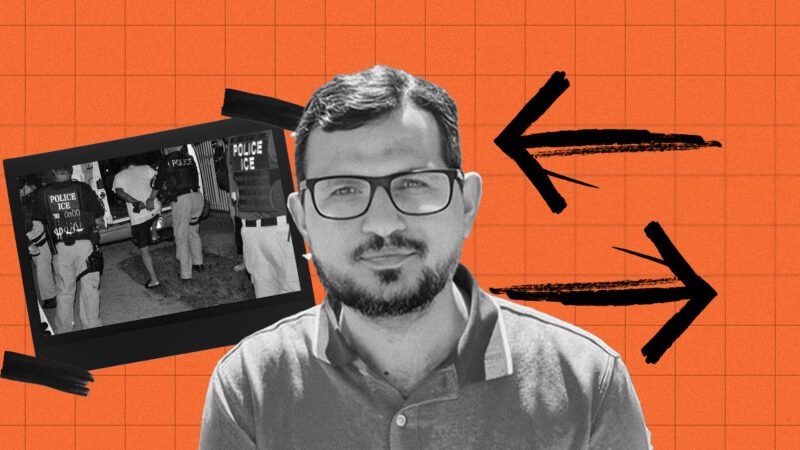ICE Arrests Afghan Asylum Seeker With Brain Cancer After He Asks for Directions
He had a valid work permit and a pending asylum claim, but Ihsanullah Garay was still detained. He now faces deportation while battling brain cancer.

On September 14, Immigration and Customs Enforcement (ICE) arrested Ihsanullah Garay after he asked for directions while making a delivery in Methuen, Massachusetts. Defending his arrest to the Lowell Sun, ICE spokesperson James Covington called Garay "an illegal alien from Afghanistan."
In fact, Garay's cousin, Abdul—an American citizen who asked to be referred to by his first name—provided Garay's student visa, which he received upon arrival in the U.S. in April 2021 to achieve his doctorate in finance at a Philadelphia university.
Covington told the Sun that Garay's visa expired on September 7, 2021, and said Garay "violated the terms of his lawful admission when he refused to leave the country." He added that Garay "will remain in ICE custody pending the outcome of his removal proceedings" and that "ICE encourages aliens to self-deport using the CBP Home application."
Garay's alleged visa expiration date was just nine days after the last U.S. forces departed Afghanistan following almost two decades of war. In the weeks prior to the final pullout, the U.S. conducted the largest civilian airlift in history, evacuating 120,000 Afghans from their homeland to save them from Taliban retribution. A return to the country at this time would have been perilous for Garay, who had been threatened via letter by the Taliban for his work as a risk manager at a bank affiliated with the former Afghan government.
Moreover, Covington's statement is false. Garay's student visa shows an expiration date of August 2022. This was five months after President Joe Biden declared that conditions in Afghanistan warranted that Temporary Protected Status (TPS) be made available to Afghans in the U.S.—a decision that President Donald Trump's Department of Homeland Security reversed this April. More importantly, Garay never applied for TPS, as he had paid a lawyer about $10,000 to help him apply for asylum in the month following the U.S. withdrawal.
Covington declined to confirm on the record why ICE classified Garay as an "illegal alien," or to clarify the date ICE provided as the expiration of his student visa.
Garay was diagnosed with stage-2 brain cancer about a month after his asylum application was filed. He required immediate surgery; according to Abdul, doctors were able to remove half the tumor. Garay's insurance would not cover a stay at a rehabilitation facility, so he moved into Abdul's computer store; that way, his cousin could transport him to his chemotherapy and radiation appointments. "He's doing better, but his memory is very reduced," Abdul reported.
Eventually, Garay moved into a place of his own. With a valid driver's license, an asylum claim in progress, and a work authorization that was valid until 2029, Garay had no indication he was in danger when he was arrested while driving for DoorDash and Grubhub in September.
Following his arrest, Garay was transferred to an ICE facility in Rhode Island. In October, he was transferred to a facility in Florida, where he would reportedly have access to better medical care. On October 14, Garay called Abdul to report that he had been moved to a facility in Georgia.
Garay was set to attend court on October 16 in Massachusetts for a bond hearing. That hearing was canceled, and Garay must request that his hearing be rescheduled in Georgia. Garay's pro bono lawyer has indicated, in Abdul's words, that in Georgia, the "law is much, much more difficult than Massachusetts."
Garay's doctor sent a letter in late September explaining Garay's diagnosis and the treatments prescribed to keep him healthy. Covington has not responded to questions about whether Garay is receiving appropriate medical care while in ICE custody.
John Moses, co-founder of the Massachusetts Afghan Alliance, heard about Garay's story through the Lowell Sun. He has reached out to many contacts to try to ensure Garay has proper assistance during and after his ICE custody.
"All of the skills I used and the contacts I used to help Afghans escape the Taliban, I'm having to use to protect Afghans from my government," Moses says.


Show Comments (47)